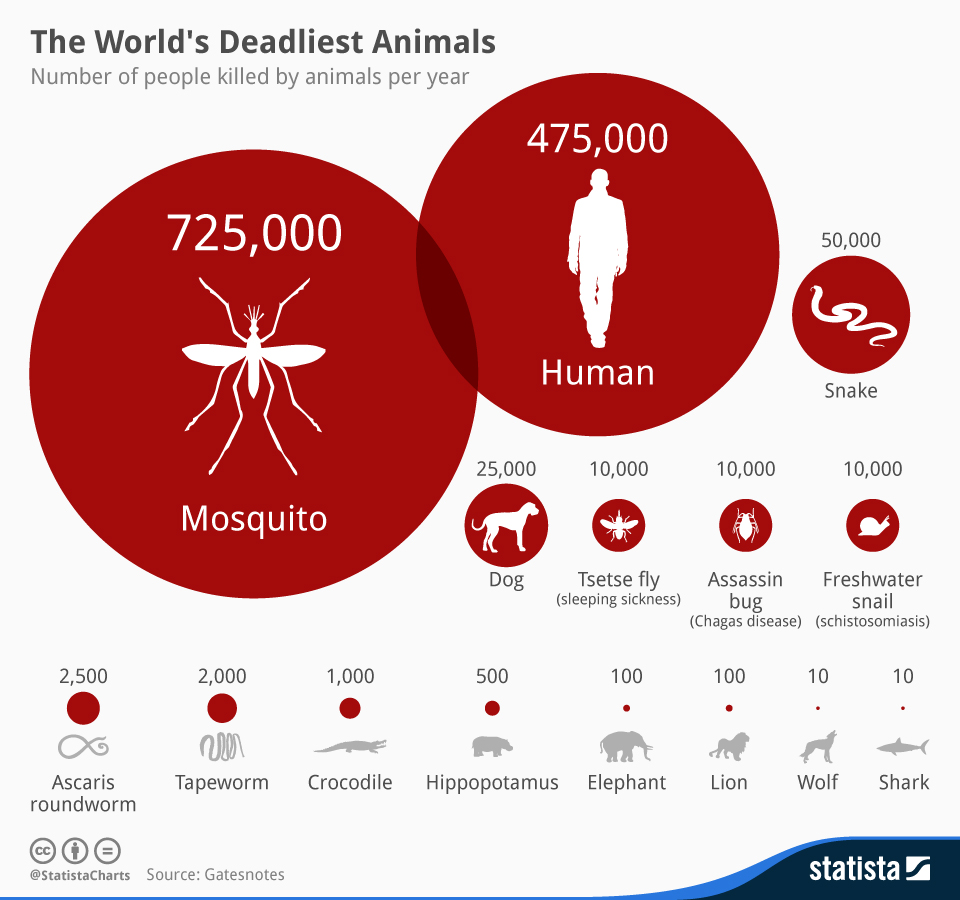Interesting Mosquito Facts You Might Not Know
Mosquitoes are the deadliest animals on Earth.
That's right, more deaths are associated with mosquitoes than any other animal on the planet. Mosquitoes may carry any number of deadly diseases, including malaria, dengue fever, yellow fever, west nile virus, zika and encephalitis. Mosquitoes also carry heartworm, which can be lethal to your dog. Your only protection is to not get bitten by this deadly pest.
All mosquitoes require water to breed. Some species can breed in puddles left after a rainstorm. Mosquitoes can breed in a little as a tablespoon of water!
Just a few inches of water is all it takes for a female to deposit her eggs. Tiny mosquito larva develop quickly in bird baths, roof gutters, and old tires dumped in vacant lots. If you want to keep mosquitoes under control around your home, you need to be vigilant about dumping any standing water every few days.
An adult mosquito may live 5-6 months in ideal conditions.
Few probably make it that long, given our tendency to slap them silly when they land on us. But in the right circumstances, an adult mosquito has quite a long life expectancy, as bugs go. If you want to find out more about a mosquitoes life span, have a look at this.
Mosquitoes can detect carbon dioxide from 30 centimeters away.
Carbon dioxide, which humans and other animals produce, is the key signal to mosquitoes that a potential blood meal is near. They've developed a keen sensitivity to CO2 in the air. Once a female senses CO2 in the vicinity, she flies back and forth through the CO2 plume until she locates her victim.
Only female mosquitoes bite humans and animals; males feed on flower nectar.
Mosquitoes mean nothing personal when they take your blood. Female mosquitoes need protein for their eggs, and must take a blood meal in order to reproduce. Since males don't bear the burden of producing young, they'll avoid you completely and head for the flowers instead. And when not trying to produce eggs, females are happy to stick to nectar, too.
Some mosquitoes don't bite humans, preferring other hosts like amphibians or birds.
Not all mosquito species feed on people. Some mosquitoes specialize on other animals and are no bother to us at all. Culiseta melanura, for example, bites birds almost exclusively, and rarely bites humans.
Mosquitoes fly at speeds between 1.5 and 2.4 kilometers per hour.
That might sound fast, but in the insect world, mosquitoes are actually rather slow. If a race were held between all the flying insects, nearly every other contestant would beat the pesky mosquito. Butterflies, locusts, and honey bees would all finish well ahead of the skeeter.
A mosquito's wings beat 300-600 times per second.
This would explain that irritating buzzing sound you hear just before a mosquito lands on you and bites.
Mosquito mates synchronize their wing beats to perform a lover's duet.
Scientists once thought that only male mosquitoes could hear the wing beats of their potential mates, but recent research on Aedes aegypti mosquitoes proved females listen for lovers, too, when the male and female meet, their buzzing synchronizes to the same speed.
Salt marsh mosquitoes may travel up to 160 kilometers from their larval breeding habitat.
Most mosquitoes emerge from their watery breeding ground and stay pretty close to home. But some, like the salt marsh mosquitoes, will fly lengthy distances to find a suitable place to live, with all the nectar and blood they could want to drink.
Mosquito biting activity increases 500 times during a full moon phase! Check out the National Graphic video.
There are over 3,500 species of mosquitoes that have already been described from various parts of the world, so these pesky pests are not going away anytime soon and will always be a global problem. Your only real protection is to not get bitten. It is ones personal responsibility to empty breeding sites and stay protected from the worlds deadliest animal.
Info can be found at insects.about.com
-Mosquitoes belong to the family Culicidae.
-Mosquitoes are insects that are known for their long, thin, proboscis-like mouthparts that they use to feed on the blood of other animals, including humans.
-Mosquitoes are widely distributed around the world and are found in almost every type of habitat, from forests to deserts to urban areas.
-Mosquitoes have been around for at least 30 million years.
-Mosquitoes play a crucial role in the food chain as they are a source of food for birds, bats, and other insects.
-Mosquitoes are responsible for spreading diseases such as malaria, dengue fever, yellow fever, and Zika virus.
-Mosquitoes can lay their eggs in water, and their larvae and pupae can be found in stagnant water sources such as swamps, marshes, and rice paddies.
-Mosquitoes are attracted to the carbon dioxide, heat, and moisture emitted by animals, which helps them find their prey.
-Mosquitoes are most active at dawn and dusk, but they can also bite during the day and night.

